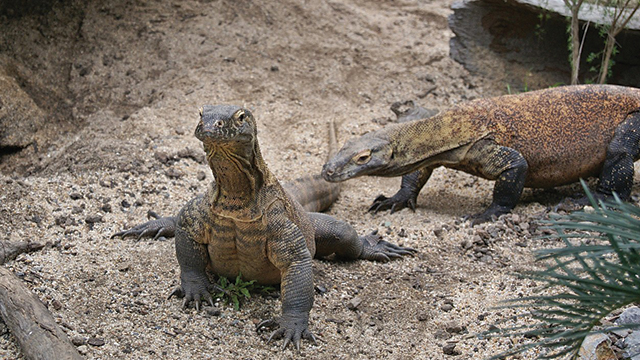Jakarta (Greeners) – East Java police and national police arrested seven suspects for six baby komodo dragons smuggling in Flores, East Nusa Tenggara.
Wiratno, director general of Natural Resources and Ecosystem Conservation of Ministry of Environment and Forestry, said the ministry cooperating with national police and all district police in Indonesia declaring “war” on illegal wildlife trading, domestic and international.
Wiratno added that they would fought even for one bird and returned to the wildlife, because animals have the rights to live.
Based on monitoring in 2018, at least 2,897 komodo dragons (Varanus komodoensis) in Komodo National Park, while outside the park, the species can be found in Flores island.
Based on site occupancy and camera trap methods, there are four to 14 komodo dragons in Wae Wuul Nature Reserve, between 2013 and 2018, two to six komodo in Ontoloe island between 2016 and 2018, six komodo in Essential Ecosystem Area in Pota Protected Forest between 2016 and 2018, and 11 komodo in Longos island in 2016.
“[The police] had confiscated six komodo dragons from three cases. Based on suspect’s information, they have conduct transactions for 41 komodo dragons in the last three years. In this investigation process, there will be development to foil illegal wildlife network,” he said in Jakarta on Tuesday (02/04/2019).
READ ALSO: Indonesia To Turn To DNA Analysis To Tackle Illegal Wildlife Trade
Experts from Zoology’s Genetics Laboratory of LIPI, stated that based on morphology of the snout, color pattern of the body and color of the tongue, it shows the species as Varanus komodoensis, which identified from Flores island, not Komodo National Park.
Further results determined through DNA to check its genetic diversity which reveals the origins of komodo dragons. The DNA examination is currently conducted at the lab and the results will be revealed in 14 working days.
The cyber police first discovered a Facebook account supplying the species, which then followed up by the National Police’s crime unit and East Java Police, starting in 22 February 2019 to 8 March 2019, who confiscated six baby komodo dragons, weighing between 0.4 to 1.6 kilograms and 75-125 centimeter length, ready to be sold overseas.
“The network does not only sell komodo, but also birds, beaver, and other animals. For komodo, the network has their own hunters in Flores and East Nusa Tenggara, their own collectors who are now in our most wanted list. They are very experienced, they no longer use air transport but land transport to fool officials. The komodo will be stored into tubes carried by drivers and couriers to Surabaya, and it will switch couriers from there,” said Adi Karya Tobing, head of special crime unit at the National Police.
Furthermore, Tobing said there are five people under investigation. The suspects, — FS, AN, NZ, AB, AW, were arrested by East Java police, and FW and RB were arrested by the National Police.
Based on suspects’ information, they have managed to sell 41 komodo dragons under their network.
“However, we also found there are 56 live animals as evidence in this case. We will also work with PPTAK (Center for Financial Transaction Reports and Analysis) to trace the money used by suspects as there are suspicions that these komodo were sold overseas,” he said.
Necessary Revision of The 1990 Law on Conservation
Following rampant illegal wildlife trading online that could push the revision of the 1990 Law on Conservation, Tobing said that not only animals needed the protection but also law enforcement because these illegal trading are getting hard to be detected in traditional or conventional markets.
“If there are incidents and cases like this, for instance the transaction can be charged just like the drugs law, there’s delivery order and undercover buy. For animals, the mode of operation is 98 percent using social media. So, if the punishment is not stricter, there will be no deterrent effects,” he said.
Indonesian government currently is not pursuing the revision of the 1990 law on conservation arguing that it is still relevant, hence no needs for improvements.
Nevertheless, Wiratno said that there’s a possibility for a revision to reopen considering low punishments given to illegal wildlife traders.
“These strict clauses need to be partially revised and it will take into considerations,” said Wiratno.
Reports by Dewi Purningsih



















































